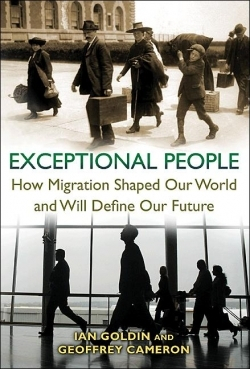Exceptional People
How Migration Shaped Our World and Will Define Our Future
“During recent years there has been a growing interest in devising some plan for checking or limiting the tide of immigration whose waves sweep in upon the United States almost daily in constantly increasing volume,” wrote Simon Croswell. Croswell published his article in 1897 but his remark applies equally to the United States in the twenty-first century, and to wealthy countries around the world.
International movement of people invites heated rhetoric and is a staple of election propaganda. During Swiss parliamentary elections in 2007, the People’s Party put up posters across the country showing three white sheep standing on the Swiss flag, one kicking away a black sheep. Party spokespersons claimed they were targeting law-breakers but observers detected hostility towards all black immigrants.
In Exceptional People, Ian Goldin and Geoffrey Cameron, of the University of Oxford, carry out an evenhanded assessment of the costs and benefits of international migration. They find that all involved—the countries that receive immigrants, those that send them, and immigrants most of all—prosper when movement across borders is allowed without hindrance. Rapidly aging Europe increasingly depends on the labor of foreigners to keep its economy afloat. America would face a gray future if Mexicans and Asians stayed away.
Despite the hardships they face during their travels and the emotional distress they suffered because of separation from loved ones, immigrants continue to arrive in developed countries. Goldin and Cameron underscore the dramatic increase in earnings that can accompany migration: “A low-skilled construction laborer in the United States will work less than 4 minutes to make enough to buy a kilogram of flour, whereas a Mexican laborer at home will have to work for more than an hour.”
Saúl Linares, a factory worker from Long Island, New York, composed a song about the harsh treatment of immigrants by an official in Arizona. The “shameless, disgraceful immigrant hater,” Linares wrote, “puts the immigrants in jail / because he says that they are crooks / but they are only looking for a decent job / that they haven’t found in their own country.” Anti-immigration campaigners who consult Exceptional People will encounter hard-to-refute arguments that favor free movement; advocates of open borders will find in the book the data and reasoning they need to fortify their case.
Reviewed by
Karunesh Tuli
Disclosure: This article is not an endorsement, but a review. The publisher of this book provided free copies of the book to have their book reviewed by a professional reviewer. No fee was paid by the publisher for this review. Foreword Reviews only recommends books that we love. Foreword Magazine, Inc. is disclosing this in accordance with the Federal Trade Commission’s 16 CFR, Part 255.

